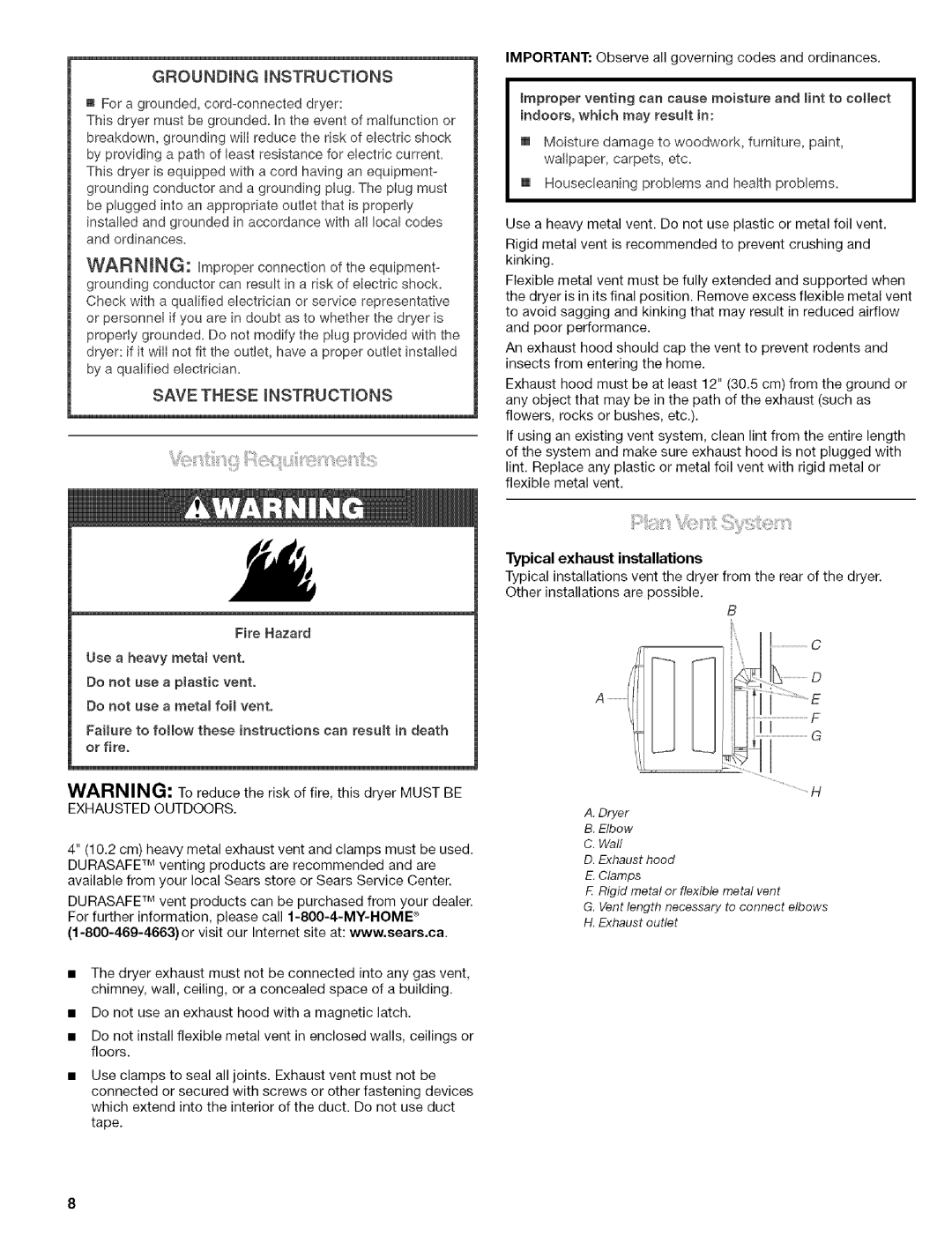
GROUNDmNG INSTRUCTIONS
_'For a grounded,
This dryer must be grounded. In the event of malfunction or breakdown, grounding will reduce the risk of electric shock by providing a path of least resistance for electric current. This dryer is equipped with a cord having an equipment- grounding conductor and a grounding plug. The plug must be plugged into an appropriate outlet that is properly installed and grounded in accordance with all local codes and ordinances.
WARNING: Improper connection of the equipment- grounding conductor can result in a risk of electric shock. Check with a qualified electrician or service representative or personnel if you are in doubt as to whether the dryer is properly grounded. Do not modify the plug provided with the dryer: if it wiII not fit the outlet, have a proper outlet installed by a qualified electrician.
SAVE THESE INSTRUOTmONS
Fire Hazard
Use a heavy metaB vent.
Do not use a pmastic vent.
Do not use a recta( foiJ vent.
Faimure to follow these instructions can result in death or fire.
WARNING: | To reduce the risk of fire, this dryer MUST BE |
EXHAUSTED | OUTDOORS. |
4" (10.2 cm) heavy metal exhaust vent and clamps must be used. DURASAFE TM venting products are recommended and are available from your local Sears store or Sears Service Center.
DURASAFE TM vent products can be purchased from your dealer. For further information, please call
The dryer exhaust must not be connected into any gas vent, chimney, wall, ceiling, or a concealed space of a building.
Do not use an exhaust hood with a magnetic latch.
Do not install flexible metal vent in enclosed walls, ceilings or floors.
Use clamps to seal all joints. Exhaust vent must not be connected or secured with screws or other fastening devices which extend into the interior of the duct. Do not use duct tape.
IMPORTANT: Observe all governing codes and ordinances.
improper venting can cause moisture and lint to cotlect indoors, which may resumt in:
[] Moisture damage to woodwork, furniture, paint, wallpaper, carpets, etc.
[] Housecleaning problems and health problems.
Use a heavy metal vent. Do not use plastic or metal foil vent.
Rigid metal vent is recommended to prevent crushing and kinking.
Flexible metal vent must be fully extended and supported when the dryer is in its final position. Remove excess flexible metal vent to avoid sagging and kinking that may result in reduced airflow and poor performance.
An exhaust hood should cap the vent to prevent rodents and insects from entering the home.
Exhaust hood must be at least 12" (30.5 cm) from the ground or any object that may be in the path of the exhaust (such as flowers, rocks or bushes, etc.).
If using an existing vent system, clean lint from the entire length of the system and make sure exhaust hood is not plugged with lint. Replace any plastic or metal foil vent with rigid metal or flexible metal vent.
Typical exhaust installations
Typical installations vent the dryer from the rear of the dryer. Other installations are possible.
B
.....................................F
....................................G
A.Dryer
B.Elbow
C.Wall
D.Exhaust hood
E.Clamps
F. Rigid metal or flexible metal vent
G. Vent length necessary to connect elbows H. Exhaust outlet
